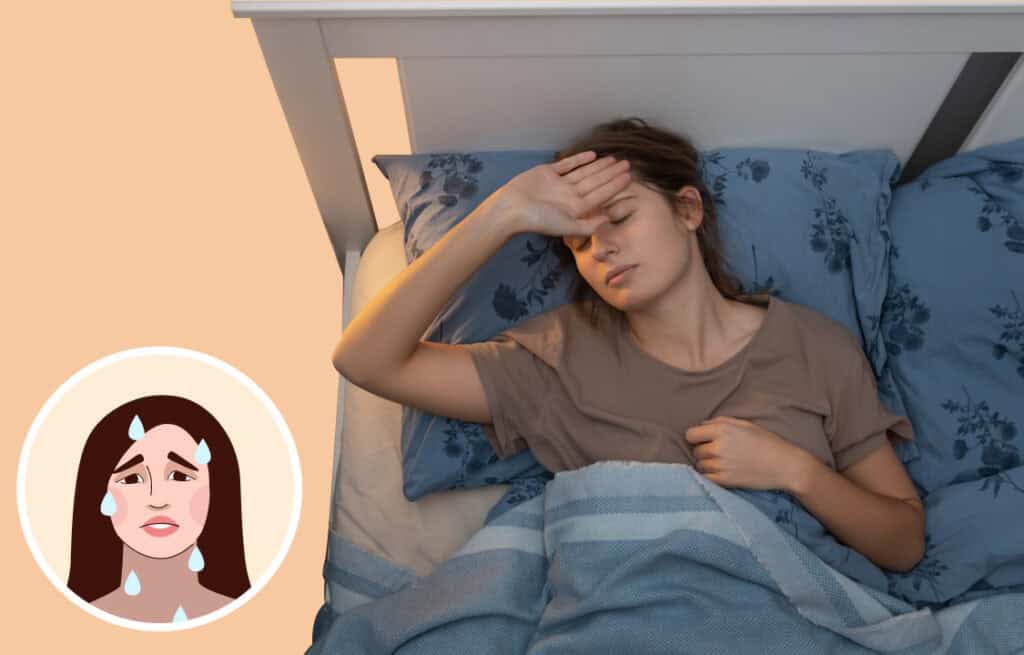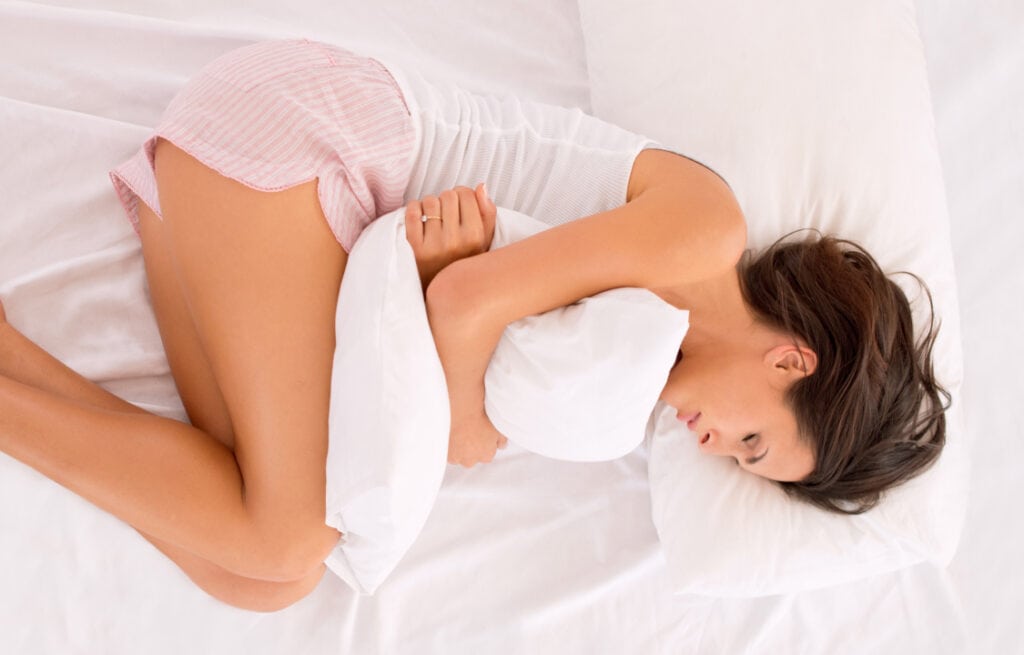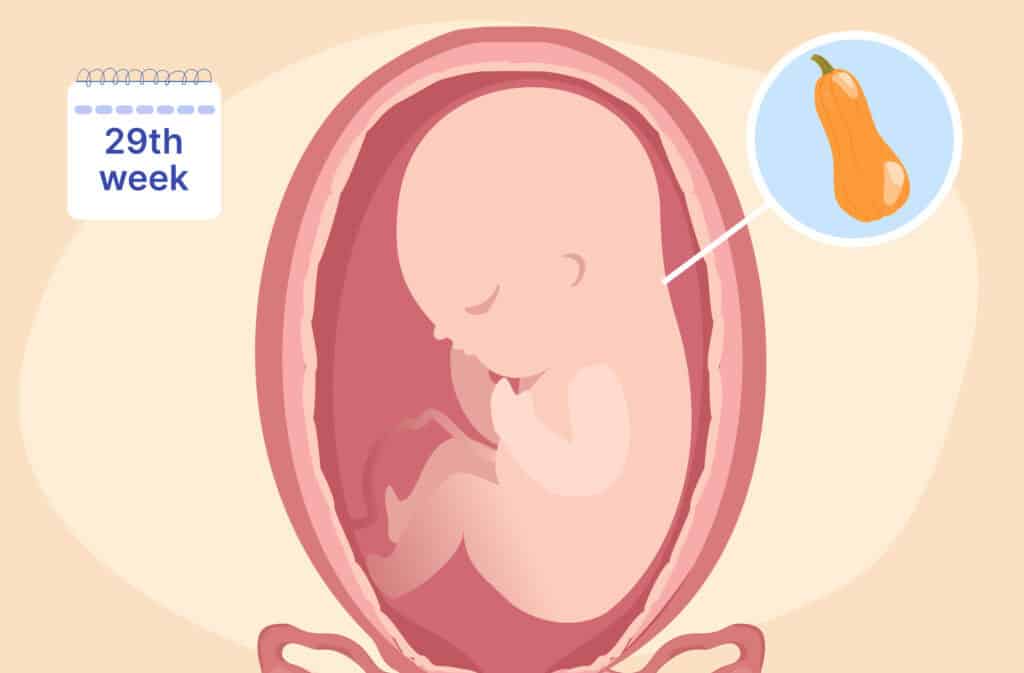Femia > Health Library > Being a mom > Recovering from birth > Postpartum night sweats: Why they happen and how to stay comfortable
Postpartum night sweats: Why they happen and how to stay comfortable

- Updated Feb 11, 2025
- Published
CRAFTED BY HUMAN
Crafted by human At Femia, we provide accurate and up-to-date information at every stage of your journey, from trying to conceive, pregnancy and postnatal support. All content is created by a real person based on in-depth research and own professional experience. Femia ensures that you will receive expert advice, strict accuracy and a personalized approach from our authors/medical experts. Learn more about our editorial policy.
FACT CHECKED
Fact checked At Femia Health, we maintain the highest standards of editorial excellence in delivering content focused on helping you conceive, guiding you through pregnancy, and supporting you postpartum. Explore our content review principles to learn how we ensure the accuracy and quality of our health and lifestyle tips for every stage of your journey.

Created with Hector Chapa, MD, FACOG, Clinical associate professor, Obstetrics and Gynecology Texas A&M University, College of Medicine in Bryan-College Station, USA
- Changing hormone levels during the postpartum period can cause night sweats.
- While night sweats aren’t much fun, they’ll usually clear up by themselves in a matter of weeks.
- In the meantime, wear breathable fabrics to bed, keep your bedroom cool, avoid spicy foods before bed, and ensure you drink enough water.
- Evening primrose oil can help to reduce night sweats.
Night sweats are excessive sweating at night. You may notice your pajamas and bedding are soaking wet with sweat when you wake up. Though this condition is mainly associated with menopause, many women experience it during the postpartum period, too. Night sweats are a common complaint of new mothers, with a 2013 study published in Fertility and Sterility explaining that up to a third of women experience night sweats during pregnancy and/or the postpartum period.
This guide will cover the basics of postpartum sweats by answering questions like, “What causes night sweats postpartum?” and “When do postpartum night sweats stop?” We’ll also discuss how to manage night sweats and when to see a doctor about this common postpartum symptom.
Femia offers personalized insights and helps you stay in control
What are postpartum night sweats?
Sweating at night is expected when your bedroom is hot, or you wear overly warm clothes. However, postpartum night sweats are when you experience excessive sweating at night in the postpartum period, even if your sleeping environment is cool. Plummeting estrogen levels are usually to blame for postpartum sweating. Postpartum night sweats usually clear up within weeks of giving birth as your hormone levels return to normal.
👉Find out more: Postpartum essentials for mom: A complete checklist for recovery
Symptoms of postpartum night sweats
Potential symptoms of this common postpartum complaint include:
- Waking up drenched in sweat.
- Having to change bed sheets more regularly.
- Having to change pajamas during the night.
- Tiredness (that could be the result of caring for the new baby, though).
- Body odor.
What causes night sweats postpartum?
Postpartum night sweats are caused by:
Postpartum hormones
Changing hormone levels are responsible for postpartum sweats. Hormones that were high during pregnancy, like estrogen and progesterone, plummet after birth, and this change in hormone levels causes symptoms including night sweats. Hormonal changes impact your hypothalamus, which controls body temperature, making it mistakenly believe you’re too hot and need cooling down.
Excess fluid
During pregnancy, your body retains excess fluid. Now that you’re no longer pregnant, your body has to figure out how to shift that extra fluid. Enter: night sweats. They may not be your favorite postpartum symptom, but they’re a vital part of your body returning to its pre-pregnancy state.
Breastfeeding
Breastfeeding can also make you sweat during the night. Prolactin, the hormone responsible for milk production, ensures estrogen levels are kept low. Low estrogen levels cause night sweats, which is why night sweats are more common among breastfeeding mothers.
How long do postpartum night sweats last?
Postpartum night sweats typically clear up without treatment within weeks of the birth. Breastfeeding mothers may find it takes longer for night sweats to stop because of the hormone prolactin and how it affects body temperature.
Generally, night sweats are worse for the first few weeks after birth and clear up by the time your baby is around three weeks old. If you’re breastfeeding, however, you may find the night sweats stick around a little longer.
Femia offers personalized insights and helps you stay in control
How do you stop postpartum night sweats?
There’s nothing you can do to prevent postpartum night sweats. They are an expected reaction to the hormonal and fluid changes of pregnancy and birth. All you can do is ride it out for the next few weeks and hope it ends soon.
How to manage postpartum night sweats
While you’re waiting for your postpartum sweats to clear up, here are some tips to help you manage this common postpartum symptom:
- Wear light pajamas made of breathable fabrics.
- Use a fan or open your bedroom window to allow air to circulate.
- Opt for breathable cotton bedsheets.
- Sleep on a bath towel that can absorb excess sweat in the night.
- Use a mattress and pillow protector to protect your bedding from sweat.
- Drink plenty of water to prevent dehydration.
Evening primrose oil
Try taking a daily dose of evening primrose oil to reduce night sweats. A 2021 study published in the Journal of Menopausal Medicine found that taking 2,000 mg of evening primrose oil daily for eight weeks was associated with decreased frequency and severity of night sweats. A 2021 study published in the Journal of Midwifery and Reproductive Health concluded that evening primrose oil was safe for new mothers.
Avoid trigger foods before bed
Some foods may trigger night sweats and hot flashes postpartum. Eating spicy food before bed can increase your body temperature and make night sweats more likely. A 2015 study published in Menopause found that caffeine use increased the risk of night sweats and hot flashes.
👉Find out more: Can you get pregnant while breastfeeding? Everything you need to know
Postpartum hot flashes
If the excess sweating occurs at night, it’s called night sweats, but during the day, you may recognize these moments of overheating as hot flashes. Hot flashes are a common complaint of breastfeeding mothers, in particular. Many new moms complain of excess sweating, needing stronger deodorant in the early days of motherhood, and feeling too warm. It may help you to:
- Stay hydrated to avoid dehydration.
- Carry deodorant with you so you can reapply it during the day.
- Wear light layers that can be easily removed when you feel a hot flash coming on.
- Remember that breastfeeding hot flashes are a normal symptom of early motherhood.
When to see a doctor
Usually, postpartum night sweats are nothing to worry about. Sometimes, however, excessive sweating can indicate an underlying issue. For example, the chills and fever of an infection could be mistaken for postpartum night sweats. If the night sweats are accompanied by a fever or feeling unwell, consult your doctor for a diagnosis.
Night sweats could also be associated with thyroid function, diabetes, and anxiety. If the night sweats last longer than three weeks, make an appointment to see your healthcare provider for advice.
Questions from the Femia community
Do postpartum night sweats affect sleep quality?
Yes, unfortunately, at a time when sleep is sorely needed, night sweats can prevent you from getting enough rest. Lightweight sleepwear and moisture-wicking sheets may help you to sleep better through the postpartum night sweats.
Can postpartum night sweats be a sign of an infection?
Yes, it’s possible to mistake night sweats or an infection for postpartum night sweats. If excessive night sweating is accompanied by a fever, chills, or a general feeling of being unwell, consult your doctor for advice.
Do postpartum night sweats mean my hormones are imbalanced?
Not necessarily. Hormonal fluctuations are expected during the postpartum period. It can take time for your hormones to return to normal levels. However, if the symptoms persist beyond the first month of motherhood, it’s worth checking in with your doctor to see if it could be related to a potential hormonal imbalance.
The bottom line
Postpartum night sweats are a common postpartum symptom experienced by around a third of new mothers. They are usually caused by plummeting estrogen levels after birth but may also be a way for the body to clear out excess fluid after pregnancy.
There’s nothing you can do to speed up the process, but there are steps you can take to make the night sweats more bearable. Keeping yourself cool by using a fan, wearing light cotton sleepwear, and using breathable cotton bed sheets can help minimize discomfort. Excessive sweating can lead to dehydration, so drinking plenty of water is crucial.
Postpartum sweating usually clears up a few weeks after you give birth. If you’re still experiencing night sweats a month after the birth, or if you feel the night sweating is excessive, speak to your doctor for advice.
The postpartum period is filled with strange symptoms, new experiences, and mental overload. However, it’s also filled with adorable baby snuggles, gaining confidence as a new mom, and falling in love with your newborn, so it’s not all bad.
References
- Amin M, et al. The Effect of Evening Primrose (Oenothera) Oil Capsule on Postpartum Pain in Multiparous Women: A Triple-Blind Randomized Clinical Trial. Journal of Midwifery and Reproductive Health. 2022; 10(4): 3480-3489. DOI: 10.22038/jmrh.2022.63183.1812 https://jmrh.mums.ac.ir/article_20453_6e50f96f853fdc46ee52a44f94e969f0.pdf.
- Faubion SS, Sood R, Thielen JM, Shuster LT. Caffeine and menopausal symptoms: what is the association? Menopause. 2015 Feb;22(2):155-8. doi: 10.1097/GME.0000000000000301. PMID: 25051286. https://pubmed.ncbi.nlm.nih.gov/25051286/.
- Kazemi F, et al. The Effect of Evening Primrose Oil Capsule on Hot Flashes and Night Sweats in Postmenopausal Women: A Single-Blind Randomized Controlled Trial. J Menopausal Med. 2021 Apr;27(1):8-14. doi: 10.6118/jmm.20033. PMID: 33942584; PMCID: PMC8102809. https://pubmed.ncbi.nlm.nih.gov/33942584/.
- Thurston, Rebecca C. et al. “Prospective evaluation of nighttime hot flashes during pregnancy and postpartum“ Fertility and Sterility, Volume 100, Issue 6, 1667 – 1672. https://www.fertstert.org/article/S0015-0282(13)02967-1/fulltext.

Feeling cramps after sex? Learn about common causes of abdominal pain after sex, symptoms, medical advice how to relieve the pain, and when to consult a doctor.

Discover what happens at 29 weeks pregnant, from baby development and symptoms to contraction tips and self-care advice.

Wondering if sushi is safe during pregnancy? Learn why raw fish should be avoided and discover pregnancy-safe sushi options, including cooked and vegetarian rolls.
